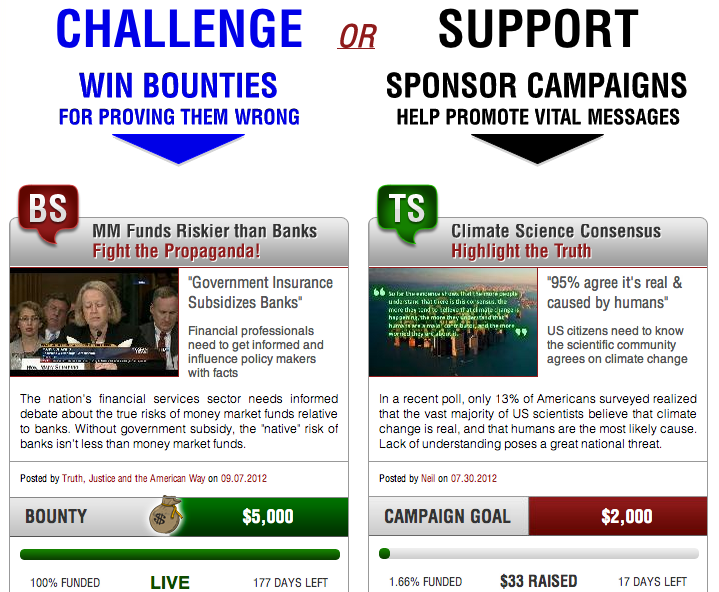Truth can be a fickle thing. And when it comes to contentious, polarized and ideologically driven issues – like climate science, the safety of fracking, or the feasibility of renewables – the ‘truth’ can be hard to find amidst the noise.
With industry-sponsored misinformation firms like the Heartland Institute or Energy in Depth playing a prominent role in ‘public education,’ and with growing factious opposition between politicians and partisan groups, the public domain has flooded with so-called scientific or expert claims intended to mislead, manipulate and sway popular opinion. Our public discourse on many key issues is polluted.
Since yesterday, however, the public has a new role to play in the information marketplace.
TruthMarket, a public platform designed to improve the conditions of political, commercial and scientific dialogue, announced its designs for increased public scrutiny of truth claims. The website is modeled after grassroots online campaigning, where crowd-sourced investigations challenge the veracity of politicized rhetoric.
Rick Hayes-Roth, Ph.D., the founder of TruthMarket and its parent enterprise Truth Seal Corp., said yesterday in a press release, “false claims, half-truths and biased polls are polluting public dialogue, commerce and public trust.” He added, “it’s time to do something constructive and give the public a mechanism to openly challenge false claims and reinforce honest dialogue.”
The current U.S. presidential elections have emphasized the need for such a public service, according to Mark L. Feldman, Ph.D., board member and principle investor in the platform. “This election year has left the public increasingly appalled by negative rhetoric, conflicting claims and misrepresentation of facts,” he said, adding, “though organizations that fact-check statements and publish their findings offer an important service, they unfortunately are not a deterrent to continued fabrication and distortion of facts.”
“TruthMarket,” says Feldman, “is already involving the public in the fight against false claims, ambiguous statements and fact spinning.”
Some of TruthMarket’s current campaigns involve claims made by the financial service sector regarding investment and the scientific community’s consensus concerning global climate disruption. Participants can claim a ‘bounty’ for exposing a claim as BS – a bogus statement – or as TS – a true statement. The funds are crowd-sponsored.
Here is a preview of the site’s layout:
The ultimate purpose of TruthMarket, according to yesterday’s press release, “is to predispose all public dialogue toward truth telling.”
“Influential supporters and advisors are already preparing TruthMarket campaigns targeting controversial public statements and the validity of actions driven by those statements,” says Hayes-Roth.
“The present state of election rhetoric has sensitized people,” he adds, “they are ready to drive honesty back into public dialogue.”
Let’s hope he’s right.
Subscribe to our newsletter
Stay up to date with DeSmog news and alerts







